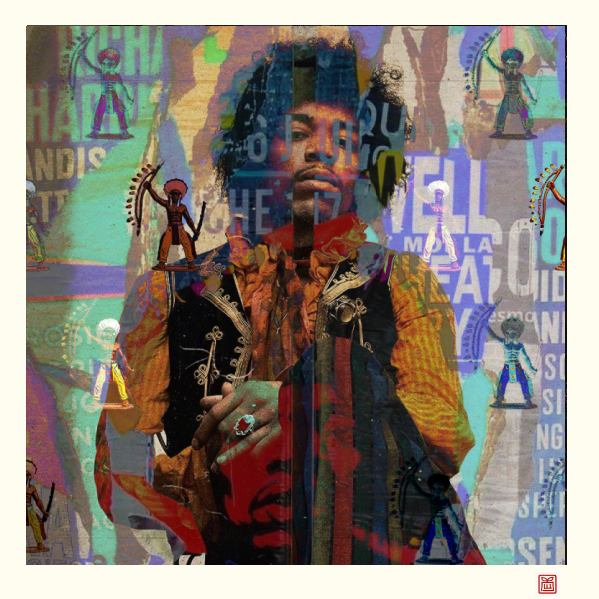 Image 1 of 1
Image 1 of 1


"Sugarcane and Rubber Tomahawks"- Limited Edition Fine Art Print
12" x 12" — Signed & Numbered
Each print in this limited-edition series is created from my original artwork and produced on premium 65 lb. acid- and lignin-free cotton paper. Printed with archival pigment inks for rich, lasting color and detail, every piece is hand-signed, numbered, and accompanied by a Certificate of Authenticity.
Edition limited to only 40 prints. Once sold out, no further reproductions will be made.
Unframed — ready for your choice of mat and frame.
About this piece:
Sugarcane and Rubber Tomahawks explores the transformation of innocence into unrest—where the polished sweetness of pop gives way to raw, electric defiance. The title plays on that tension: sugarcane as the pastel gloss of bubblegum music, rubber tomahawks as a symbol of identity reduced to novelty, power stripped of its edge. Hendrix, whose heritage carried echoes of both Native and African ancestry, stands here as a figure of reclamation—turning artifice into authenticity, sound into resistance. Through its vivid color and layered decay, the piece asks how culture evolves when rebellion is both sacred and sold.
12" x 12" — Signed & Numbered
Each print in this limited-edition series is created from my original artwork and produced on premium 65 lb. acid- and lignin-free cotton paper. Printed with archival pigment inks for rich, lasting color and detail, every piece is hand-signed, numbered, and accompanied by a Certificate of Authenticity.
Edition limited to only 40 prints. Once sold out, no further reproductions will be made.
Unframed — ready for your choice of mat and frame.
About this piece:
Sugarcane and Rubber Tomahawks explores the transformation of innocence into unrest—where the polished sweetness of pop gives way to raw, electric defiance. The title plays on that tension: sugarcane as the pastel gloss of bubblegum music, rubber tomahawks as a symbol of identity reduced to novelty, power stripped of its edge. Hendrix, whose heritage carried echoes of both Native and African ancestry, stands here as a figure of reclamation—turning artifice into authenticity, sound into resistance. Through its vivid color and layered decay, the piece asks how culture evolves when rebellion is both sacred and sold.
